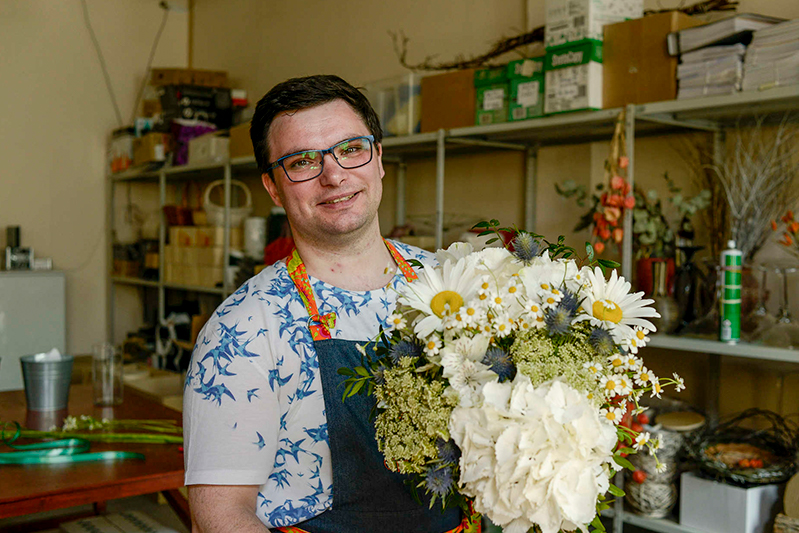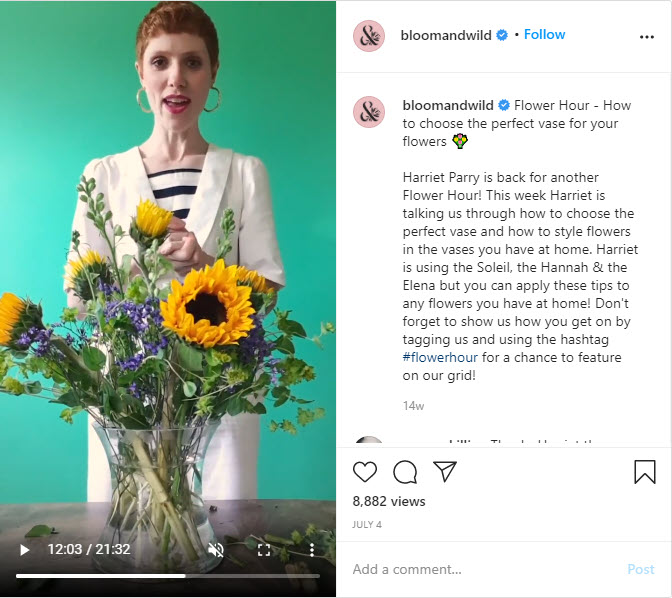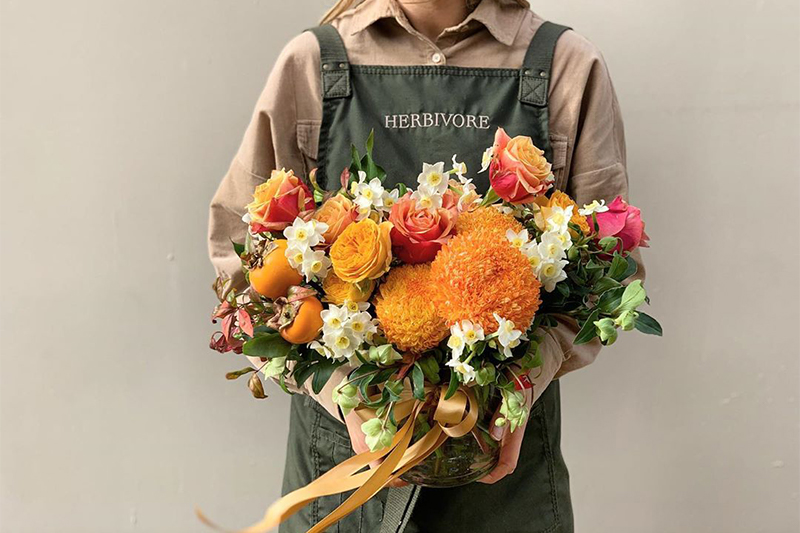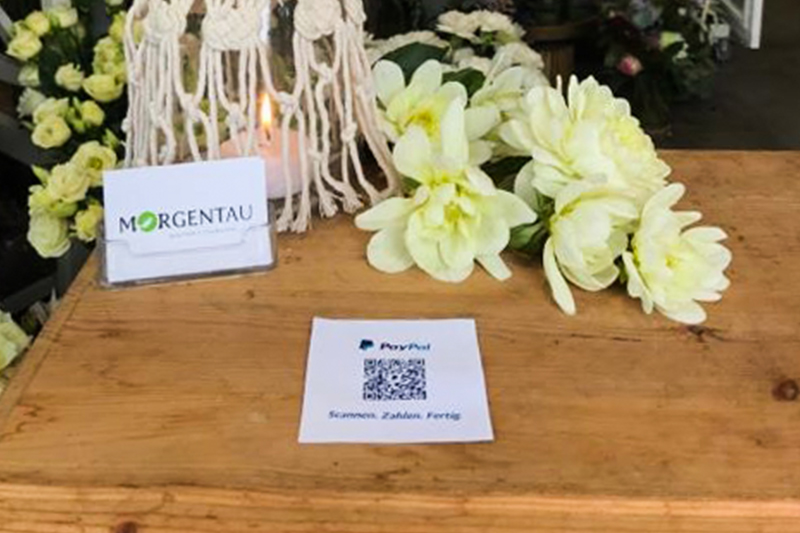From Australia to Germany, global florists adapt to pandemic realities.
Product PayPal Innovation QR Code
The flower business changes from season to season, quite literally. But while florists are used to navigating change, the COVID-19 pandemic created challenges on a scale no one imagined.
Estimated at $8.5 billion, the global cut flower industry depends on a thriving events business for large orders. But with weddings, celebrations and corporate contracts cancelled or greatly reduced in size, significant portions of the business disappeared, as did foot traffic from individual customers into brick-and-mortar floral shops.
“It happened so fast,” said Luke Stone, managing director of Melbourne Australia’s
Herbivore Florals. Among Luke’s customers: several airline clients that relied on Herbivore Florals for fresh flowers in their airport lounges. When travel restrictions went into place in March, that business disappeared.
The Herbivore team, and other florists around the world, have found ways to adapt amidst the pandemic. Whether diversifying product selection or using digital tools to make the customer experience simpler in a contactless world, this industry’s entrepreneurs are blossoming through ingenuity.
Growing flower businesses across borders

Moscow-based florist Georgy Sukharzhevsky has added digital
features to his online flower shop, Obradoval.
Over the past few years, entrepreneurs have been growing their flower businesses with creative solutions, transforming the traditionally brick-and-mortar industry into one that’s more digital savvy and caters to customers across borders.
Take
Obradoval, an online flower retailer based in Moscow with customers across Europe and North America. Obradoval founder and owner Georgy Sukharzhevsky has added features to their digital experience for customers, like the ability to receive a photo of the recipient the moment they get their bouquet. As any florist will tell you, the heart of the business is spreading joy. “It’s about the great emotions that you bring to people,” said Georgy. “It is not just the receiver who feels excited, but also the person sending the gift,” he said.
Or take Bloom & Wild, an online flower retailer based in the U.K., who blossomed to 2.5 million customers in just seven years by expanding operations to Ireland, Germany and France. With more people spending time at home during the pandemic, the business has seen a rise in customers sending flowers "just because." And along with gifting to loved ones, some customers are even treating themselves, using Bloom & Wild's flower selection to brighten up their homes while spending more time indoors.
Finding new ways to spread joy

Bloom & Wild hosts “Flower Hour” on Instagram as a new way to
engage customers. Credit: Bloom & Wild Instagram
With the pandemic drastically accelerating
the shift to online shopping, having a user-friendly digital payments solution – for both customers and merchants – is a gamechanger.
“Being a digitally native brand has undoubtedly helped us throughout the pandemic,” said Bloom & Wild’s Gary Taylor, adding that about a quarter of the business’ payments come through PayPal. While Bloom & Wild has always been a digital-first company, its team has recently introduced creative new ways to improve the customer experience, including “boredom-busting” digital content, like handy how-to videos for arranging flowers at home.
Speaking in a recent episode of PayPal’s
The Adaptables Podcast, Herbivore Florals’ Luke explained some of the adaptations he’s made while navigating these challenging times. Early in the pandemic, Luke’s brother Curtis, a well-known chef, saw demand for restaurant delivery orders climbing, which sparked Luke’s decision to apply similar thinking to his flower business.
He started offering contactless delivery for free to local customers in Melbourne – a simple gesture that helped build goodwill. Because Australians were staying home, demand for Mother’s Day deliveries actually climbed, making it one of the busiest holidays Herbivore Florals has experienced – a silver lining in otherwise challenging times.

Melbourne’s Herbivore Florals began offering free contactless
deliveries during the pandemic. Credit: Herbivore Florals Instagram.
Luke also credits his team, who – like Bloom & Wild – were quick to realize that more time spent at home meant consumers had an even bigger need for comforting products. So, along with using online sales and delivery to keep flower sales afloat, the business evolved to launch a new suite of wellness products that go beyond just flowers. Along with the usual colorful fresh flower selection, customers could choose from beautifully presented gift packages like “At Home Spa Day” and “Spring Rejuvenation,” which feature luxurious hand washes, body scrubs, lotions, chocolates, and wine. While those products were a quick new offering to respond to business dwindling elsewhere, Herbivore plans to continue growing the selection and diversifying, even as Australia returns to more normal times.
"That's how you have to be in business. I don't think you can just be one thing; you have to be adaptable,” Luke said. “You're not in it for the short-term, so you've got to think like that and make sure you're making decisions that are going to keep you around longer term.”
Thinking digital for safety and convenience
For Jenny Preuss and David Marocki, owners of the flower shop
Morgentau in Hamburg, Germany, the pandemic was a push to reach customers in new ways, which they did by relaunching their website, establishing an online store and using WhatsApp for flower orders. The florists introduced WhatsApp to collaborate with customers on more customized designs – a process that is friendlier and more efficient than email, and that has enabled them to attract new customers from across Germany.

Hamburg-based florist Morgentau offers
PayPal QR Code for touch-free payment.
In addition to growing their online presence, having a solution in place for safe, touch-free payments was also important for Morgentau’s brick-and-mortar store. The German business
turned to PayPal QR Code as an alternative payment option that allows customers to easily scan the code, enter an amount and pay digitally – all without any cash, cards or paper receipt handling. Flexibility in where and how customers pay also enabled Morgentau to introduce curbside pickups during the pandemic. The business created a pickup spot with a Plexiglass window and clearly visible QR codes. Now, David and Jenny are exploring a 24-hour collection box for customers who are unable to come by the shop during regular hours.
“At first, the slump in sales were an existential threat to me. I didn't know how to make ends meet,” David reflected. “But this situation forced me to act. The decision to relaunch my website and install an online store was not only a happy solution for my customers, but also offered my company great growth potential,” he added.
As countries around the world are in various stages of reopening, florists from Australia to Germany are continuing to find new ways to reach customers and spread joy, particularly heading into the holiday season. This season, Morgentau’s David expects customer preferences to lean more towards dried flowers and plants, while Herbivore Floral’s Luke plans to continue stocking gift packages in addition to flowers. Luke attributes such pivots as indications that creative thinking in times of disruption can lead to long-term gains. “It's been an interesting journey, but not necessarily a bad one,” he said. “You get confidence in your ability to roll with the punches.”